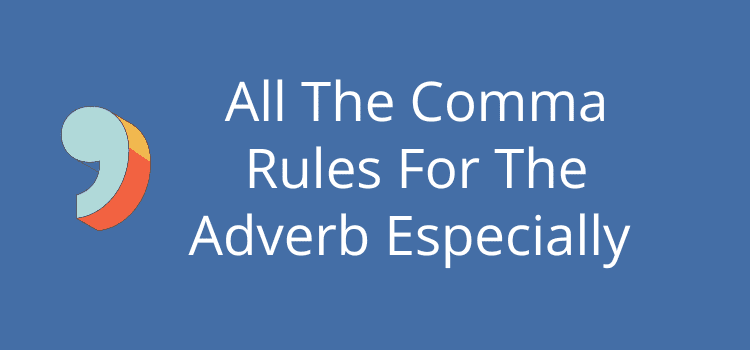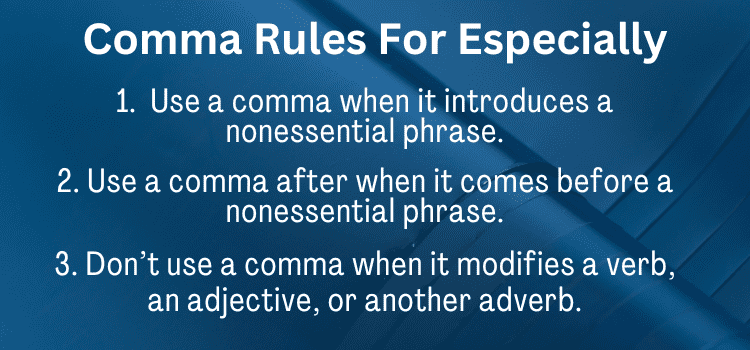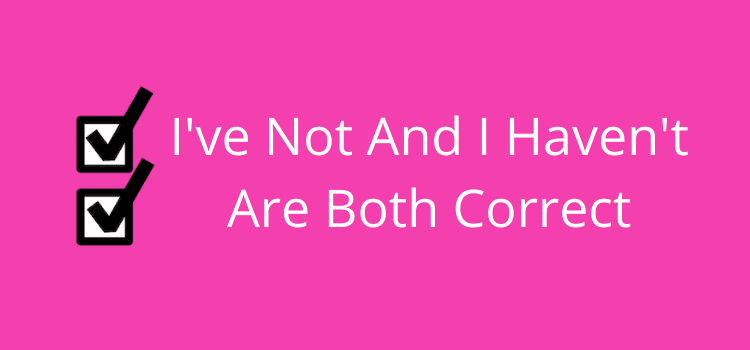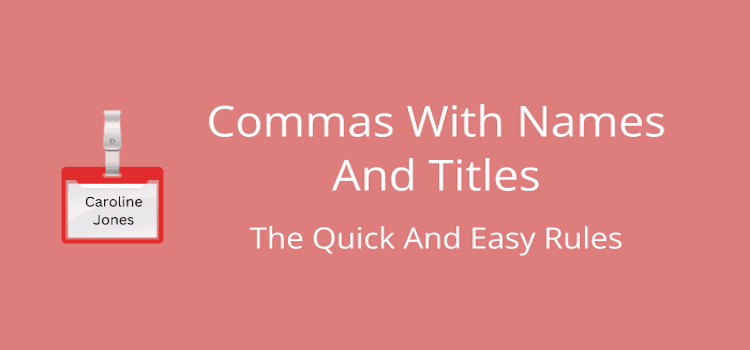
The adverb especially, is a very common word we use in writing to add emphasis or precision to a sentence. We use it to say that something is particular or above all else.
However, it can cause a little confusion when it comes to using correct punctuation. It’s not always easy to decide on the correct punctuation.
When do you use a comma before or after, especially? Or when do you omit the comma?
Because this adverb has many uses, the comma rules depend on what it does in a sentence. Here is a quick guide to help you.
What is the adverb especially?
We can use especially to single out one person or thing over all others or to indicate a greater extent. It can also mean very much.
It is extremely versatile because it can modify verbs, adjectives, or other adverbs.
She dances especially well. (modifies the verb)
He is especially clever. (modifies the adjective)
They arrived especially early. (modifies another adverb)
We also use it to introduce a phrase that specifies a particular person, thing, or situation.
I like almost all kinds of music, especially blues. (specifies the category)
She adores animals, especially horses. (specifies an animal)
Ted enjoys traveling, especially to Asia. (specifies a destination)
As these examples show, the adverb especially has many different uses.
Why are the comma rules tricky?

The comma rules for the adverb especially, are a little tricky.
It always depends on the position and function of especially in a sentence.
Sometimes, it is part of the main clause and does not need a comma.
Other times, it is part of a parenthetical element or additional final clause and needs a comma before it.
Less frequently, especially may need a comma after it.
In most cases, it is when the adverb is at the end of the main part of a sentence, and extra information is added in a final nonessential clause.
The key to using commas correctly is to identify whether the adverb is essential or nonessential to the meaning of the sentence.
Essential information cannot be removed without changing the meaning or clarity of the sentence.
Nonessential information can be removed without affecting the meaning or clarity of the sentence.
You don’t need to be a grammar or syntax expert to make the right punctuation choices.
You only need to analyze a sentence and check what the adverb is doing.
If you can identify the use, correct punctuation is easy.
But because there are so many options, let’s look at each one in more detail.
When to use a comma before especially
You always add a comma before especially when it introduces a nonessential phrase that specifies a particular person, thing, or situation.
The additional phrase is a parenthetical element because you can remove it without changing the meaning of the sentence.
The food they served was fantastic, especially the dessert.
I always have to think about punctuation, especially colons and semicolons.
The essay was difficult for me to write, especially the introduction.
The easiest way to check if you need a comma is to remove the last phrase.
If the sentence still makes sense without it, then you need a comma before especially.
The food they served was fantastic.
I always have to think about punctuation.
The essay was difficult for me to write.
You should also use a comma before especially when it starts a nonessential clause that adds extra information or comment at the end of the sentence.
This clause is also called a sentence-final clause because it comes after the main clause and can be removed without changing its meaning.
I was certainly very happy to help them with the project, especially since they paid my travel costs.
Always be careful when you visit a city for the first time, especially when going out at night alone.
Again, you can test whether you need a comma before especially by removing the clause that follows it.
When to use a comma after especially
You should use a comma after especially when it comes before a parenthetical element or at the end of one.
This is rare because we mostly use especially at the beginning rather than at the end of a phrase or clause.
However, it is possible to do so and still follow the same logic as using a comma before especially.
Martin is a talented classical musician especially, but he sometimes plays with a local rock band.
Sarah enjoys traveling to Europe especially, then writes about her experiences on her blog.
If the sentence still makes sense without the last clause, then you need a comma after especially.
When to use no comma
You don’t add a comma with especially when it modifies a verb, an adjective, or another adverb in the main clause.
In this case, the adverb is adding extra meaning to the sentence, so you can’t remove it.
Matthew writes especially well for a young boy.
He is especially talented at fiction writing.
The family arrived especially early to hear his reading for the local writing group.
We’re all especially excited about the prospects of him publishing a book.
Another possible situation is when especially comes after a conjunction such as or, and, or but.
In this case, especially is part of the second clause but may not need to be separated from the first clause by a comma.
He plays the guitar and especially likes playing loud rock riffs.
She is a good student but especially lazy with homework.
All the attendees arrived on time or especially early for some.
You won’t use this form very often, but it’s handy to know.
However, style and grammar guides differ on this comma usage point; some may suggest using a comma.
I checked the three sentences above with my grammar checker, which advised using no commas.
The choice is up to you. But if it’s any help, I would usually prefer to use a comma.
Common mistakes to avoid with especially
A common mistake with especially is using it interchangeably with specially.
Although they sound similar and can sometimes be interchanged, they do have slightly different meanings and uses.
Specially means for a specific purpose or in a special or unique way. If you can replace specially with specifically or particularly, then it’s the right choice.
It usually modifies verbs or adjectives and does not need commas.
He baked a cake specially for Mary’s 21st birthday.
She wore a specially designed dress for the occasion.
Another mistake to avoid is using it redundantly with words like particular, specific, or certain.
This creates unnecessary repetition and weakens the emphasis of the sentence.
The new product is especially particularly innovative.
It is especially essential that we complete this project on time.
I am especially certain that we will win the game.
We need to be especially specific in our instructions.
In the examples above, especially is redundant and should be omitted.
Summary
You can use the adverb especially in so many different ways and positions in a sentence.
While this gives you a lot of flexibility, it also affects how and when you use commas.
The three comma rules to remember are pretty easy, however.

1. Use a comma before especially when it introduces a nonessential phrase or clause that specifies a particular person, thing, or situation.
2. Use a comma after especially when it comes before parentheses or at the end of a parenthetical element.
3. Don’t use a comma with especially when it modifies a verb, an adjective, or another adverb in the main clause or (optionally) when it comes after a conjunction.
If you follow these three simple rules, you will avoid punctuation errors and use the adverb especially correctly and effectively in your writing.
Related Reading: Between And Among – The Two Or Many Rule Is A Myth



